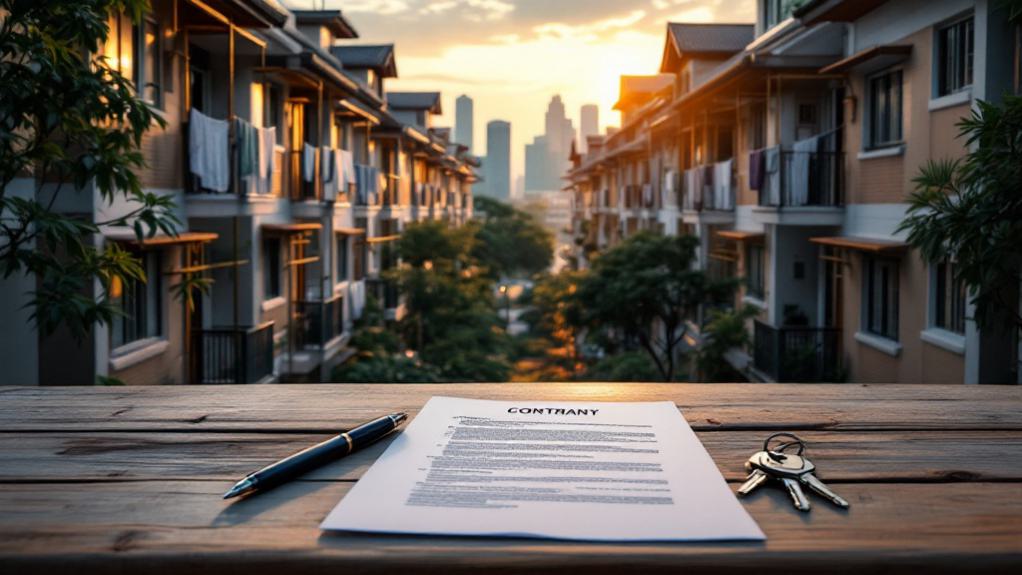Singapore tenants possess specific rights, including quiet enjoyment of rented premises, 24-48 hour landlord notice before entry, and clear maintenance responsibility divisions. Tenancy agreements, legally binding documents, must stipulate rent amounts, lease durations (minimum three months for private properties, six months for HDB flats), and security deposit terms (typically one month’s rent for annual leases). Disputes under $20,000 can be addressed through Small Claims Tribunals, while mediation services remain available through the Community Mediation Centre. The subsequent sections outline extensive protections for residential occupants.

While Singapore’s robust property market offers numerous housing options for residents and expatriates alike, the legal framework governing tenant rights remains a critical yet often overlooked aspect of the rental experience. The tenancy agreement, a legally binding document, delineates the rights and responsibilities of both parties, covering essential aspects such as rent amount, lease duration, security deposit requirements, and maintenance obligations.
The rental landscape in Singapore demands careful attention to tenant rights, often overshadowed by the allure of diverse housing opportunities.
In Singapore, private properties require a minimum lease period of three months, while Housing Development Board (HDB) flats mandate a six-month minimum commitment.
Security deposits represent a significant financial consideration, typically amounting to one month’s rent for a one-year lease or two months’ rent for a two-year commitment. This sum, refundable at the conclusion of the tenancy minus costs for damages exceeding normal wear and tear, must be returned within a reasonable timeframe. The agreement should include a specific deadline for refund to protect tenant interests.
Disputes regarding deposit refunds may be adjudicated through the Small Claims Tribunal, with the important caveat that these funds cannot offset rent during the occupancy period.
Tenants in Singapore possess the right to quiet enjoyment and privacy within their rented premises. Landlords must provide advance notice, typically 24-48 hours, before entering the property, except in emergency circumstances or for urgent repairs. Effective communication is vital to prevent misunderstandings or disputes that could deteriorate the landlord-tenant relationship.
The tenancy agreement should clearly delineate maintenance responsibilities, with landlords generally accountable for major repairs and structural issues, while tenants assume responsibility for minor upkeep and prompt reporting of maintenance concerns. Conducting thorough property handovers at the beginning and end of tenancy helps establish the condition of the property and prevents disputes about damages.
Regarding financial considerations, rent increases require written agreement, with no rent control regulations governing private properties in Singapore. Proper notice must be provided for non-renewal of leases, typically one to two months.
Early termination provisions, including the diplomatic clause that permits expatriates to terminate their lease after twelve months under specific circumstances, should be explicitly outlined in the agreement.
For dispute resolution, options include the Small Claims Tribunals for matters up to $20,000, the Community Mediation Centre, and advocacy support from organizations such as Singapore Tenants United for Fairness (STUFF), with legal aid available for eligible low-income tenants.
Frequently Asked Questions
Can I Withhold Rent if My Landlord Doesn’t Make Repairs?
Withholding rent is illegal in Singapore, regardless of unaddressed repair issues.
Tenants must fulfill rental payment obligations independently from landlord maintenance responsibilities, as Singapore law does not recognize “repair and deduct” provisions.
Lease agreements typically stipulate that any breach of payment terms constitutes a contractual violation.
Alternative options include documented repair requests, mediation through Community Mediation Centre, Small Claims Tribunal applications, or negotiating rent reductions while maintaining consistent payments according to contractual obligations.
What Happens if I Need to Break My Lease Early?
Breaking a lease early typically results in financial consequences, including forfeiture of security deposits and potential liability for remaining rent until a replacement tenant is secured.
Lessees should review their agreement for diplomatic, en-bloc, or force majeure clauses that may permit early termination under specific circumstances.
Proper procedure involves written notice, negotiation with the landlord, and documentation of all communications.
Disputes regarding leases up to two years can be addressed through the Small Claims Tribunal.
Are Landlords Allowed to Increase Rent During the Lease Period?
Landlords in Singapore are generally prohibited from increasing rent during a fixed-term lease period, unless the lease agreement explicitly contains rent review clauses permitting such adjustments.
Mid-lease increases may be permissible under specific circumstances, including adaptation periods after six months, significant economic changes, or to offset higher maintenance fees and taxes, though these typically require mutual consent between both parties.
Proper written notice must be provided before implementing any rent hike.
How Much Notice Must a Landlord Give Before Visiting the Property?
In most residential tenancy situations, landlords must provide a minimum of 24 hours’ written notice before visiting a property, though specific requirements may vary based on local regulations and the terms outlined in the tenancy agreement.
Some agreements stipulate longer notice periods, typically ranging from 1-7 days for non-emergency access, while allowing exceptions for urgent repairs or emergency situations where immediate entry is necessary to prevent property damage.
Who Is Responsible for Pest Control in Rental Properties?
Pest control responsibility in rental properties is typically determined by the tenancy agreement, with general guidelines allocating duties between parties.
Landlords are primarily responsible for delivering pest-free premises initially and addressing structural infestations, while tenants must maintain cleanliness to prevent pest attraction.
For mid-tenancy infestations of unclear origin, shared responsibility often applies.
In Singapore, no specific legislation governs pest control obligations, making clear lease provisions particularly important for dispute prevention.





